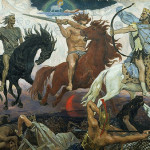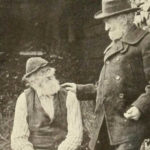We run our website the way we wished the whole internet worked: we provide high quality original content with no ads. We are funded solely by your direct support. Please consider supporting this project.

Is the Bible History?
Even though I argued for interpreting the final form of the biblical canon as opposed to using the history behind the text in my post yesterday, I am not endorsing the radical post-modern view that biblical texts possess “semantic autonomy” and thus lack any historical referentiality. While I have no problem whatsoever accepting that God used folklore and myth in his “God-breathed” word, and while I grant that the line between “history” and “fiction” in ancient writers was not nearly as hard and fast as it is for modern historians, I am nevertheless persuaded that, unless we have reasons to think otherwise, we should accept that history-looking narratives were written with a historical intent.
Yet, to affirm the historical-intentionality of history-looking narratives is not to affirm that the “God-breathed” status or authority of such narratives depends on our determining their congruity with someone’s reconstruction of “what actually happened.” In Barth’s terms, history-looking narratives may be geschichte (narrated history) even if they do not qualify as historisch (demonstrable history), for “Nicht alle Geschichte ist historisch.” (“Not all history is historical.”) So too, I affirm, with Barth, that it is as geschichte, not historisch, that biblical narratives can to be considered “God-breathed.”
For this same reason, unless I have exegetical reasons for thinking a passage belongs to the genre of folklore or myth, I adopt a “biblical realist” stance and treat history-looking narratives as historical (geschichte), without concerning myself with the extent to which they may or may not conform to someone’s historical-critical reconstruction of “what actually happened.”
So too, while I argue on Christological, theological, and literary grounds that the way OT authors sometimes theologically interpret events reflects a culturally-conditioned perspective that followers of Jesus must regard as pen-ultimate, I nevertheless treat as historical the events they theologically interpret.
Hence, for example, while I argue that followers of Jesus must reinterpret Jeremiah’s portrait of Yahweh smashing the heads of children and parents in the Babylonian siege of Jerusalem (Jer. 13), I do not question that this siege actually took place and that it in fact involved children and parents being smashed together in the process. Similarly, while I argue that we must, in the light of Christ, reinterpret the Genesis author’s view that Yahweh sent the flood that wiped out almost every living human and animal on the earth, I treat the narrative as historical without concerning myself with the contested issues of how this narrative coheres with the geological record and thus with whether the flood was global, local or even mythic.
Along the same lines, my view of interpreting the final form of the canon does not lead me to concern myself with critical discussions regarding the alleged pre-canonical history of any passage. It’s not to deny the findings of source and redactional criticism. Rather, my silence is due to my conviction that these arguments are irrelevant to my theological commitment to work with the final canonical form of the biblical text.
To give one illustration, many critical scholars view the Conquest narrative as a compilation of a number of originally independent traditions. Among these traditions, it is argued, we may discern one that depicted Yahweh promising to get the children of Israel into the promised land by slowly relocating the Canaanites, another that depicts Yahweh promising to relocate the Canaanites through the use of pestilence, and yet another in which Yahweh is portrayed as telling Moses to have the Israelites slaughter “everything that breathes.” The arguments supporting this perspective lead me to consider it to be quite probable. Yet, because these traditions ended up being woven together as a single canonical narrative, I consider this (potentially historically complex) narrative to be “God-breathed” and thus shall treat it as a single narrative. And, despite the fact that many critical scholars are convinced it reflects little “actual history,” I shall nevertheless treat it as historical, for its authority as a witness to geschichte is not contingent upon its congruity with the scholarly opinion of historisch.
In this light of this, we should assume that, even if history-looking canonical narratives do not reflect the historical facts as we would assess them in modern historical analysis, they nevertheless pass on a memory of what God has done in the world and include a real truth that often can’t be captured by our modern conceptions about how history should be recorded.
Image by Vasnic64 via Flickr.
Category: General
Tags: Bible, Bible Interpretation, Cruciform Theology, Historical Criticism
Topics: Biblical Interpretation
Related Reading

Podcast: Must We Believe in the Historicity of the OT Stories to Trust in the Bible and in Jesus?
Things get deep, literarily, as Greg discusses deep literalism. http://traffic.libsyn.com/askgregboyd/Episode_0384.mp3

Reflections on the Supremacy of Christ (Part 1)
In my previous post I argued that the Bible tells a story in which the culminating event – the coming of Christ – reframes everything that preceded it. Though it is all inspired, not everything in it should carry equal weight for us. Rather, everything leading up to Christ, including the portraits of God, must…

Unpacking Revelation: Is it Literal?
According to many scholars as well as many Christian laypeople, the Jesus we find in the book of Revelation engages in a great deal of violence. This violence reaches a zenith in chapter 19 where we find Jesus going out to make war on a white horse (v. 11). He is dressed in a blood…

Something Else is Going On
The violent portraits of God in the Old Testament are a stumbling block for many. In this short clip, Greg introduces the idea that “something else is going on” in these passages, and that we can begin to see this something else when we put our complete trust in the character of God as fully revealed in…

The Cruciform Beauty of Horrific Divine Portraits
“Only a person who is aware of the crucified Christ can properly understand Scripture.” Luther (Table Talks) In the last three posts I’ve been wrestling with how insights from Matthew Bate’s book, The Hermeneutics of the Apostolic Proclamation might help us interpret violent portraits of God in the OT in a way that discloses how…

Podcast: Where Does Forgiveness Fit in a Cruciform Theology?
Greg offers looks at forgiveness in a realm of natural consequences. http://traffic.libsyn.com/askgregboyd/Episode_0298.mp3
